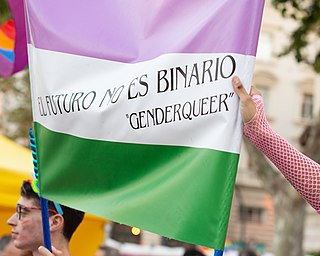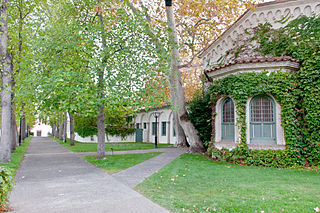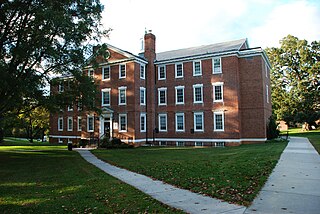
Bryn Mawr College is a women's liberal arts college in Bryn Mawr, Pennsylvania. Founded as a Quaker institution in 1885, Bryn Mawr is one of the Seven Sister colleges, a group of historically women's colleges in the United States. It is one of 15 Quaker colleges in the United States. The college has an enrollment of about 1,350 undergraduate students and 450 graduate students. It was the first women's college to offer graduate education through a PhD.

Smith College is a private liberal arts women's college in Northampton, Massachusetts. It was chartered in 1871 by Sophia Smith and opened in 1875. It is a member of the historic Seven Sisters colleges, a group of women's colleges in the Northeastern United States. Smith is also a member of the Five College Consortium with four other institutions in the Pioneer Valley: Mount Holyoke College, Amherst College, Hampshire College, and the University of Massachusetts Amherst; students of each college are allowed to attend classes at any other member institution. On campus are Smith's Museum of Art and Botanic Garden, the latter designed by Frederick Law Olmsted.

Non-binary and genderqueer are umbrella terms for gender identities that are not solely male or female. Non-binary identities often fall under the transgender umbrella since non-binary people typically identify with a gender that is different from the sex assigned to them at birth, though some non-binary people do not consider themselves transgender.
The Seven Sisters are a group of seven liberal arts colleges in the Northeastern United States that are historically women's colleges. Barnard College, Bryn Mawr College, Mount Holyoke College, Smith College, and Wellesley College are still women's colleges. Vassar College is currently a coeducational college and Radcliffe College was absorbed in 1999 by Harvard College and now offers programs in advanced study.

Spelman College is a private, historically Black, women's liberal arts college in Atlanta, Georgia. It is a founding member of the Atlanta University Center academic consortium. Founded in 1881 as the Atlanta Baptist Female Seminary, Spelman awarded its first college degrees in 1901 and is the oldest private historically Black liberal arts institution for women.

Mills College at Northeastern University in Oakland, California is part of Northeastern University's global university system. Mills College was founded as the Young Ladies Seminary in 1852 in Benicia, California; it was relocated to Oakland in 1871 and became the first women's college west of the Rockies. In 2022, it merged with Northeastern University following several years of alleged financial difficulties.
Hollins University is a private university in Hollins, Virginia. Founded in 1842 as Valley Union Seminary in the historical settlement of Botetourt Springs, it is one of the oldest institutions of higher education for women in the United States.

The National Panhellenic Conference (NPC) is an umbrella organization for 26 national and international women's sororities throughout the United States and Canada. Panhellenic refers to the group's members being autonomous social Greek-letter societies of college women and alumnae.

Unisex public toilets are public toilets that are not separated by gender or sex.

Women's colleges in the United States are private single-sex U.S. institutions of higher education that only admit female students. They are often liberal arts colleges. There are approximately 26 active women's colleges in the United States in 2024, down from a peak of 281 such colleges in the 1960s.

Men's colleges in the United States are primarily those categorized as being undergraduate, bachelor's degree-granting single-sex institutions that admit only men. In the United States, male-only undergraduate higher education was the norm until the 1960s. The few remaining well-known men's colleges are traditional independent liberal arts colleges, though at present the majority are institutions of learning for those preparing for religious vocations.

The transgender rights movement is a movement to promote the legal status of transgender people and to eliminate discrimination and violence against transgender people regarding housing, employment, public accommodations, education, and health care. A major goal of transgender activism is to allow changes to identification documents to conform with a person's current gender identity without the need for gender-affirming surgery or any medical requirements, which is known as gender self-identification. It is part of the broader LGBT rights movements.

Campus Pride is an American national nonprofit 501(c)(3) organization founded by M. Chad Wilson, Sarah E. Holmes and Shane L. Windmeyer in 2001 which serves lesbian, gay, bisexual and transgender (LGBT) and ally student leaders and/or campus organization in the areas of leadership development, support programs and services to create safer, more inclusive LGBT-friendly colleges and universities.

Athlete Ally is a nonprofit LGBTQ athletic advocacy group based in the United States. They focus on making athletic communities more inclusive and less discriminatory and helping athletes to advocate for LGBTQ equality.
Transgender pregnancy is the gestation of one or more embryos or fetuses by transgender people. As of 2023, the possibility is restricted to those born with female reproductive systems. However, transition-related treatments may impact fertility. Transgender men and nonbinary people who are or wish to become pregnant face social, medical, legal, and psychological concerns. As uterus transplantations are currently experimental, and none have successfully been performed on trans women, they cannot become pregnant.

Eli Erlick is an American activist, writer, academic, trans woman and founder of the organization Trans Student Educational Resources.

Trans Student Educational Resources (TSER) is a United States-based organization advocating for greater recognition of transgender youth in educational institutions. The organization was founded in 2011 by teen activists Eli Erlick and Alex Sennello and is currently the only national organization led by transgender youth.
The participation of transgender people in competitive sports, a traditionally sex-segregated institution, is a controversial issue, particularly the inclusion of transgender women and girls in women's sports.
The term womxn is an alternative spelling of the English word woman. Womxn, along with the term womyn, has been found in writing since the 1970s to avoid perceived sexism in the standard spelling, which contains the word man.














